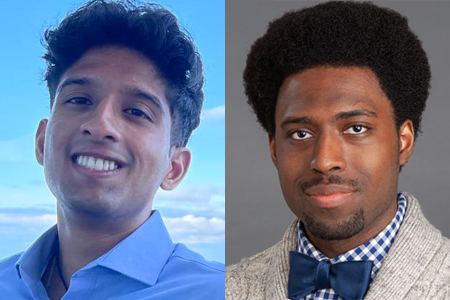Two Graduate Students Place at Biomedical Research Symposium

Oct. 16, 2023 - Two UCI biomedical engineering students were recognized for their research at the 7th Annual City of Hope Biomedical Research Graduate Student Symposium in August. The students, Rahul Sreedasyam and Kalan Leaks, participated in the conference poster session that was hosted by the cancer center to promote students who are exploring advancements in therapies.
Sreedasyam placed first among master’s students for his research on fibroblasts, cells that help create tissue structures. His poster presentation detailed his recent study that used a laser to create a microbubble to induce stress on cells, causing them to signal. Sreedasyam investigated the relationship between these cell signals and the distance, medium and orientation of the cells in relation to the microbubble to better understand cellular processes that may indicate underlying disease.
He also measured mechanical properties of the cells like stiffness by analyzing the expansion and collapse of the microbubble. Since many diseases exhibit changes in cells’ mechanical properties, his research could help recognize and begin treating these diseases earlier. In particular, Sreedasyam’s work could serve as the base for new methods of breast cancer detection since changes in the stiffness of breast tissue can be a sign of early-stage cancer.
“Receiving recognition at the conference was a validation of the work that I have put into this research,” said Sreedasyam, who plans to continue in this field of research and pursue a doctorate. “I felt that attending this conference opened doors to new opportunities.”
Leaks placed third among doctoral students during the poster session for his recently published research using machine learning to analyze health differences between people with varying alcohol consumption patterns. He pooled data on health markers such as iron levels and blood pressure of people from different demographics who were organized by their drinking patterns including those abstaining from alcohol, moderately consuming, binging and drinking heavily. The machine learning program was able to determine who was consuming and who was abstaining from alcohol at a notable level using the health markers and demographic information.
“Binge and heavy drinking generally receive a lot of notoriety, while moderate drinking has only recently received attention,” Leaks explained. “I began to question what was truly a ‘healthy’ amount of alcohol to consume, and that question led me to our group's publication.”
Leaks plans to continue with his current research, seeking a better understanding of the relationship between alcohol consumption patterns and the human body by incorporating genetic data next. He also intends to continue working on how to convey the information to different audiences.
– Lilith Christopher
